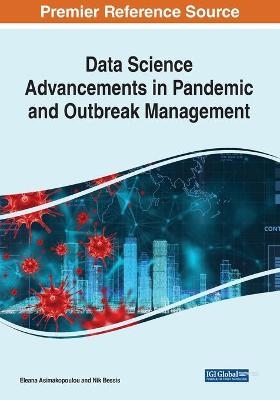
Data Science Advancements in Pandemic and Outbreak Management
Business Science Reference (Verlag)
978-1-7998-6737-1 (ISBN)
Pandemics are disruptive. Thus, there is a need to prepare and plan actions in advance for identifying, assessing, and responding to such events to manage uncertainty and support sustainable livelihood and wellbeing. A detailed assessment of a continuously evolving situation needs to take place, and several aspects must be brought together and examined before the declaration of a pandemic even happens. Various health organizations; crisis management bodies; and authorities at local, national, and international levels are involved in the management of pandemics. There is no better time to revisit current approaches to cope with these new and unforeseen threats. As countries must strike a fine balance between protecting health, minimizing economic and social disruption, and respecting human rights, there has been an emerging interest in lessons learned and specifically in revisiting past and current pandemic approaches. Such approaches involve strategies and practices from several disciplines and fields including healthcare, management, IT, mathematical modeling, and data science. Using data science to advance in-situ practices and prompt future directions could help alleviate or even prevent human, financial, and environmental compromise, and loss and social interruption via state-of-the-art technologies and frameworks.
Data Science Advancements in Pandemic and Outbreak Management demonstrates how strategies and state-of-the-art IT have and/or could be applied to serve as the vehicle to advance pandemic and outbreak management. The chapters will introduce both technical and non-technical details of management strategies and advanced IT, data science, and mathematical modelling and demonstrate their applications and their potential utilization within the identification and management of pandemics and outbreaks. It also prompts revisiting and critically reviewing past and current approaches, identifying good and bad practices, and further developing the area for future adaptation. This book is ideal for data scientists, data analysts, infectious disease experts, researchers studying pandemics and outbreaks, IT, crisis and disaster management, academics, practitioners, government officials, and students interested in applicable theories and practices in data science to mitigate, prepare for, respond to, and recover from future pandemics and outbreaks.
Eleana Asimakopoulou received the MA and PhD degrees in the area of Disaster Management from the University Westminster and Loughborough University, UK, in 2009 and 2008 respectively. She is been a lecturer and a visiting researcher in various institutions including the Hellenic National Defence College, Athens, Greece and an expert evaluator in national and European proposals for funding. Her research is in the area of utilizing disruptive technologies (IoT, grid and cloud computing) for disaster management. She has been involved in a number of projects and has published over 60 works. Dr Asimakopoulou is an editor of a book and an associate editor of a refereed international journal. Nik Bessis is a full Professor of Computer Science and the Head of Department of Computing at Edge Hill University, UK. Prior to that, Nik was a full Professor of Computer Science and the Director of Distributed and Intelligent Systems (DISYS) research centre at the University of Derby, UK. He holds a PhD and a MA from De Montfort University, UK and a BA from TEI of Athens, Greece. Professor Bessis is a Fellow of HEA, BCS and a Senior Member of IEEE. His research is on social graphs for network and big data analytics as well as on developing data push and resource provisioning services in IoT, FI and clouds. He has led several projects worth over £3m. He has published over 250 works and won 4 best paper awards. He has chaired over 40 international events, delivered 4 keynote speeches, edited 4 SIs, 8 books and 9 conference proceedings. His latest 2 edited books on IoTs & big data have been ranked as top 25 & top 40 on Amazon AI book lists. He is also the founding editor-in-chief of IJDST. Professor Bessis has served as an expert evaluator for the Hellenic QAA and, as an assessor for more than 10 Professorships conferment worldwide.
| Erscheinungsdatum | 09.04.2021 |
|---|---|
| Sprache | englisch |
| Maße | 178 x 254 mm |
| Themenwelt | Mathematik / Informatik ► Informatik ► Datenbanken |
| Studium ► Querschnittsbereiche ► Epidemiologie / Med. Biometrie | |
| ISBN-10 | 1-7998-6737-4 / 1799867374 |
| ISBN-13 | 978-1-7998-6737-1 / 9781799867371 |
| Zustand | Neuware |
| Haben Sie eine Frage zum Produkt? |
aus dem Bereich


